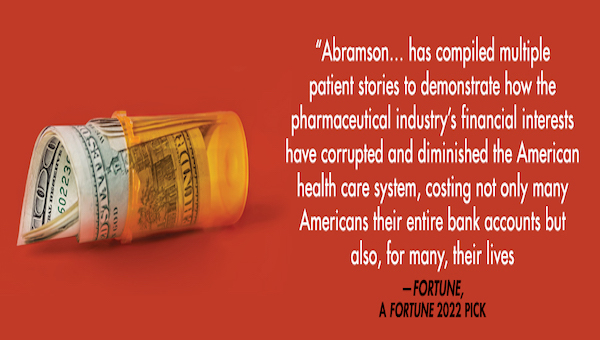
HOW BIG PHARMA BROKE AMERICAN HEALTH CARE
BY: TERRY GRAEDONSITE: PEOPLE'S PHARMACY
TRENDING
Activism
AI
Belief
Big Pharma
Conspiracy
Cult
Culture
Economy
Education
Entertainment
Environment
Faith
Global
Government
Health
Hi Tech
Leadership
Politics
Prophecy
Science
Security
Social Climate
Universe
War
In this episode, Dr. John Abramson describes how Big Pharma affects American health care, starting with medical research. What can we do about it?
This week on our nationally syndicated public radio show, Dr. John Abramson describes the impact of Big Pharma on American health care. In the US, we spend more on healthcare than any other country (both overall and per capita). However, our health metrics are mostly mediocre. Compared to other wealthy countries, they are abysmal!
Big Pharma Controls Medical Research:Starting several decades ago, medical researchers increasingly get their funding for studies from the pharmaceutical industry. As a result, they conduct trials with the primary goal of developing new drugs. While this can encourage innovation in some instances, it leaves big gaps in other areas.
If studies truly illuminated best practices for health care, many or most of them would compare healthy lifestyle practices to medications. That almost never happens.
Sharing Medical Knowledge:
According to Dr. Abramson, Big Pharma controls the way medical knowledge is shared. Unfortunately, this has an insidious effect on medical journals. Health care reporters, doctors and patients all look to peer-reviewed medical journals and trust the reports published there. Is that trust misplaced? Dr. Abramson suggests that peer review has been hamstrung by those funding the studies.
Drug Ads on TV Serve Big Pharma:
The US is one of only two countries in the world that allows direct-to-consumer advertising for prescription drugs. (The other is the tiny island nation of New Zealand.) How do these commercials affect our health care?
One clear impact is demand. The ads are designed to highlight the benefits of the drugs and downplay any risks. Perhaps you’ve noticed that the announcer runs through the list of serious side effects pretty rapidly, while the people on screen are having a wonderful time. (Obviously, we find this irritating; that’s why we keep mentioning it.) As a result, consumers get a prejudiced view of the medication and end up believing it is much more helpful than it may actually be.
We are probably stuck with prescription drug ads for the foreseeable future. However, Big Pharma should be required to provide the Number Needed to Treat (NNT) in every ad. Not only would this help patients weigh the benefits and risks of the advertised medicines; it would also speak to the other very important audience for these ads, the doctors. Drug companies are well aware that physicians watch television, too. A big part of the intended effect of the ad is to get the healthcare provider to start prescribing the drug.
Another possible effect of overpowering presence of drug commercials may be that on-air discussion is stifled. What producer wants to run a critique of Big Pharma between two appealing ads for pricey prescription drugs?
What About Statin Statistics?
Dr. Abramson has crunched the numbers on statins. Most physicians and patients believe that statins are extraordinarily effective at preventing heart attacks and deaths.
Dr. Abramson shares some startling stats about the number of people that need to take a statin for five years to prevent one heart attack. This information is essential for health professionals and patients to better understand the true effectiveness of the drugs they take for granted.
How Big Pharma Influences Practice Guidelines:
The pharmaceutical industry had the money and the political influence to help determine who serves on the committees that design practice guidelines. These influential doctors tell their peers how important health problems should be handled.
Ideally, the guidelines would be based on the evidence. However, Dr. Abramson says, evidence-based medicine isn’t based on the evidence. It is based instead on the carefully controlled results of studies that the industry has funded and helped design.
How We Can Repair the Damage:
Dr. Abramson has a few suggestions for how we can fix the current situation. First, we need to make sure that the market for prescription drugs is based on fair competition with unbiased evaluation of drug effectiveness, safety and value. That crucial step is going to require some important changes in the way medical research is conducted and the results are disseminated.
In addition, all Americans must have health insurance. We should ensure that the purchasers of health care–the employers, unions, Medicare, the VA, and so on–demand a fair market.
At the same time, we consumers need to recognize that we are paying too much for substandard care. To change that and to re-institute meaningful government oversight, Dr. Abramson believes we’ll need to recreate a functional democracy. Currently, the pharmaceutical industry spends a great deal of money on every side of Congress to protect its interests from legislation and regulation.
This Week’s Guest:
John Abramson, MD, MSc, has been on the faculty of Harvard Medical School for twenty-five years, where he teaches health care policy. He also served as a family physician for 22 years, during which he was named a “top doctor” six times in local, state, and national surveys.
Dr. Abramson has served as an expert in national pharmaceutical litigation and as an unpaid consultant to the FBI and Department of Justice, including in a case that resulted in the largest criminal fine in U.S. history. In addition to many academic articles and op-eds in the New York Times and other publications, he is the author of Overdosed America: The Broken Promise of American Medicine . Dr. Abramson’s latest book is Sickening: How Big Pharma Broke American Health Care. and How We Can Repair It .
Listen to the Podcast:
The podcast of this program includes an extra question and answer not in the broadcast. It will be available Monday, August 8, 2022, after broadcast on August 6. You can stream the show from this site and download the podcast for free. You will not want to miss this interview!
Click 3 Dots Below to View Complete Sidebar



